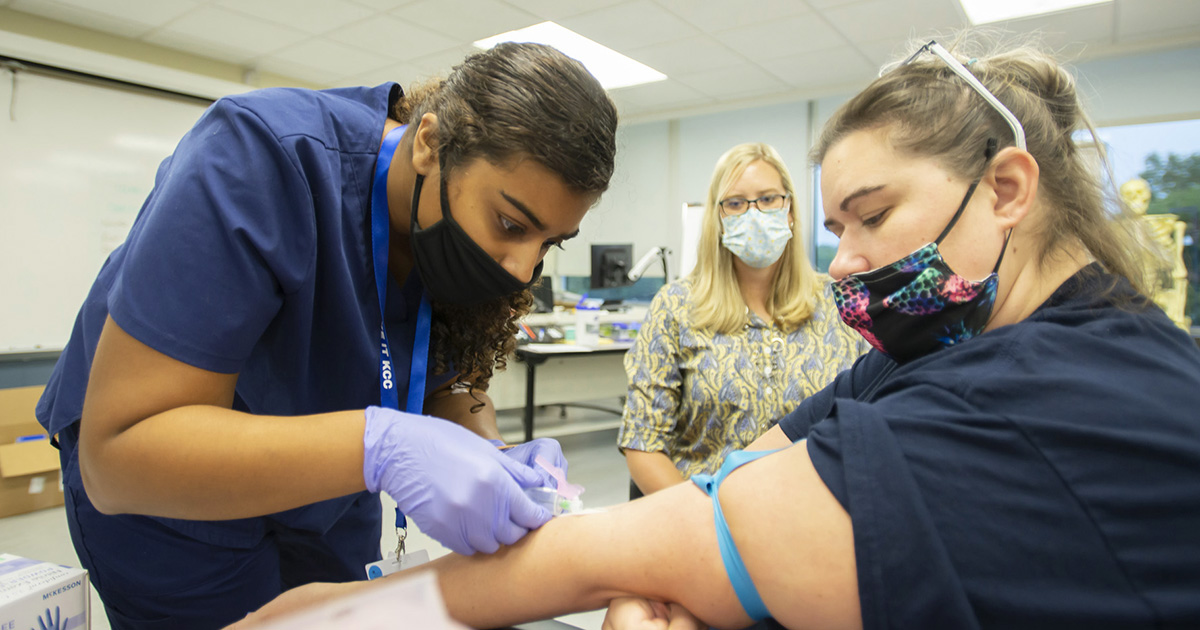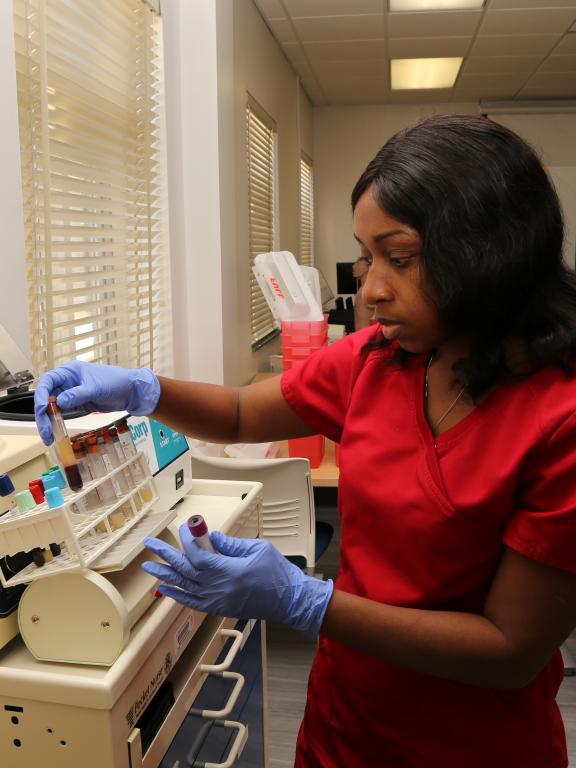Phlebotomy Courses Near Me: Step-by-Step Application Process
Phlebotomy Courses Near Me: Step-by-Step Application Process
Blog Article
What You Need to Know Prior To Starting a Phlebotomy Educating Training Course for Future Success
Before you begin a phlebotomy training program, it's vital to comprehend what the function requires and the skills you'll need to do well. Investigating recognized programs can establish the foundation for your education, yet do not forget the value of hands-on experience and social abilities. You'll likewise desire to take right into account qualification requirements details to your state. So, what should you focus on in your prep work? Allow's explore the crucial elements that can shape your future in this area. Phlebotomy school.
Recognizing the Duty of a Phlebotomist
Phlebotomists play an essential function in the health care system, as they are in charge of injuring samples for tests, transfusions, or contributions. You'll find on your own operating in numerous settings, like health centers, centers, and labs, where accuracy and professionalism and reliability are crucial. Daily, you'll engage with clients, explaining treatments to relieve their anxiety, which helps build trust fund and rapport.
Your jobs consist of preparing tools, keeping a sterilized atmosphere, and making certain precise labeling and documents of examples. You'll additionally need to remain upgraded on safety procedures and regulations, as patient safety is non-negotiable. Phlebotomists commonly team up with other medical care experts, adding to exact diagnoses and reliable treatment plans.
In this function, you need to be detail-oriented and reliable, as well as possess a strong feeling of empathy. Being a phlebotomist isn't just regarding drawing blood; it has to do with making a favorable effect on patients' lives.
Secret Skills Required for Success in Phlebotomy
To prosper in phlebotomy, you'll need a mix of technical and social skills that establish you apart from others in the healthcare area (Phlebotomy Training Course). Initially, grasping venipuncture methods is vital; you should be comfy with needles and discover to draw blood efficiently. Focus to information is very important, as accurate labeling and paperwork can considerably influence patient treatment
Social skills additionally play a vital function. You'll engage with individuals routinely, so being understanding and approachable helps relieve their anxiousness. Good communication skills are necessary for describing procedures and seeing to it clients feel educated and safe.
In addition, time management and organizational abilities will keep you efficient, especially in active healthcare settings. Staying updated on safety and security methods and laws is non-negotiable to guarantee both your security and that of your individuals. By honing these skills, you'll place on your own for success in the dynamic area of phlebotomy.
Picking the Right Phlebotomy Training Program
How can you guarantee you're choosing the best phlebotomy training program for your needs? Start by looking into certified programs in your area. Certification confirms the program satisfies market requirements and supplies quality education. Check the curriculum to confirm it covers necessary abilities like venipuncture, client communication, and safety and security methods.

A program that helps you safeguard a work post-training can provide you a substantial advantage in your phlebotomy occupation. With these factors in mind, you'll locate a program that fits your objectives and sets you up for success.
Accreditation and Licensing Requirements
When it concerns starting your phlebotomy job, understanding accreditation and licensing demands is essential. Each state has certain policies you need to comply with, so it is necessary to research study what relates to you. Additionally, you'll have to navigate the accreditation examination process to guarantee you're fully qualified.
State-Specific Rules
While seeking a job in phlebotomy, recognizing state-specific guidelines for accreditation and licensing is crucial. Furthermore, some states might mandate a specific number of scientific hours or a specific level of training before you can function as a phlebotomist. By understanding what's needed, you'll be better prepared to begin your phlebotomy profession effectively.
Certification Examination Process
As you get ready for an occupation in phlebotomy, comprehending the qualification exam procedure is necessary to your success. First, research the licensing companies, like the National Phlebotomy Association or the American Culture of Phlebotomy Technicians. Each has particular needs, consisting of training, clinical experience, and application charges. As soon as you satisfy these prerequisites, you'll require to schedule your exam. It usually contains multiple-choice questions covering topics from composition to security procedures. Research study carefully using practice tests and testimonial materials. After passing, you'll get your qualification, which boosts your employability. Keep in mind, maintaining your accreditation may call for continuing education and learning or routine re-examinations, so remain informed regarding any kind of adjustments in guidelines to ensure your qualifications remain legitimate.
Task Market Overview for Phlebotomists
As you think about a job in phlebotomy, it is critical to understand the task market overview. Need for proficient phlebotomists is on the surge, driven by the growing healthcare industry. You'll also would like to know what wage assumptions to prepare for as you tip into this satisfying area.
Work Need Trends
The task market for phlebotomists is expected to expand significantly in the coming years, driven by an enhancing need for clinical screening and the aging populace. As medical care facilities broaden and new laboratories open, you'll find extra opportunities for employment. Phlebotomy Courses Near Me. Hospitals, facilities, and blood contribution facilities are proactively seeking certified phlebotomists to meet the requirements of patients requiring routine blood job and specialized tests. In addition, improvements in clinical innovation are creating new screening techniques, further fueling demand. With a concentrate on preventative care and very early medical diagnosis, your abilities in phlebotomy will certainly be necessary. Remaining upgraded with qualifications and training can enhance your employability and setting you positively in this expanding work market.
Income Expectations Review
Phlebotomists can expect a competitive wage that shows their abilities and the growing need in the medical care sector. Generally, you may make between $35,000 and $45,000 each year, relying on your place, experience, and the facility you help. In urban locations, wages have a tendency to be higher as a result of the price of living and raised need for health care solutions. In addition, qualification can improve your making potential, making you an extra attractive prospect. Numerous phlebotomists additionally take pleasure in benefits such as medical insurance and retired life straight from the source strategies, which can additionally include to your general from this source payment. As the sector proceeds to increase, job opportunities and salary prospects for phlebotomists are most likely to boost, making this a promising career choice.
Potential Job Paths and Advancement Opportunities
While seeking a phlebotomy training course, you may discover a variety of occupation courses and development chances that await you in the medical care field. As a qualified phlebotomist, you can operate in health centers, blood contribution facilities, or analysis research laboratories. Each establishing deals one-of-a-kind experiences and difficulties, enabling you to develop your abilities.
You might additionally check out field of expertises, such as coming to be a contributor phlebotomy technician or a research laboratory assistant. These roles frequently offer added training and can cause higher wages.
If you're aiming for improvement, think about going after further education in medical modern technology or nursing. This can open doors to supervisory duties or also medical monitoring positions. Networking within the health care community can also help you reveal job openings and mentorship opportunities. Accept these opportunities, and you'll discover that your phlebotomy profession can develop in exciting ways.
Tips for Doing Well in Phlebotomy Training and Beyond

Practice makes ideal, so capitalize on any hands-on chances. Acquaint yourself with various strategies and tools to build your confidence. Keep a positive perspective, as your mindset can substantially affect your efficiency.
Network with market professionals and look for mentorship; this can result in valuable insights and work opportunities after college graduation. Lastly, think about continuing education and learning or accreditations to enhance your abilities and remain updated in the area. By complying with these pointers, you'll not just do well in your training but view it likewise lay a strong structure for a fulfilling job in phlebotomy.
Regularly Asked Concerns
What Is the Typical Cost of Phlebotomy Training Programs?
The average expense of phlebotomy training programs typically ranges from $700 to $2,500, relying on the organization and location. You must research various options to locate a program that fits your budget plan and requirements.
How Much Time Does Phlebotomy Training Normally Take to Total?

Are There Age Restrictions for Register in Phlebotomy Courses?
There aren't stringent age constraints for phlebotomy training courses, yet many programs require you to be a minimum of 18. Some might approve younger pupils with adult approval or if you're registered in a relevant curriculum.
Can I Work While Going To Phlebotomy Training?
Yes, you can function while attending phlebotomy training. Lots of trainees handle part-time tasks together with their researches. Simply make certain to balance your timetable efficiently, so you can concentrate on both job and your training.
What Material Do I Need for Phlebotomy Training?
For phlebotomy training, you'll need personal protective devices like handwear covers and masks, laboratory layers, a sharps container, alcohol wipes, needles, and blood collection tubes. Ensure you have actually got every little thing prepared before your first class starts.
Report this page